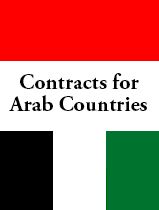The contracts in Arabic that foreign companies must negotiate with clients and partners in Arab countries, such as Saudi Arabia or the Emirates, have a number of peculiarities that should be known in order to succeed in the negotiations and close agreements. Arab countries constitute a diverse region in geography, ethnicity, religion, as well as cultural practices and business etiquette. The heterogeneity of the Arab world means that it is necessary to get into some details about doing business in each country, to take advantage of the opportunities offered to foreign negotiators. One of the aspects that must be known are the particularities that the Arabs have in terms of negotiating and signing contracts with foreign companies.

ARAB COUNTRIES: BRITISH OR FRENCH INFLUENCE
The Arab world is quite vast. It is made up of about twenty countries, many of them former colonies of the United Kingdom and France. Based on this colonial past and geographical location, the Arab countries can be divided into two large groups:
- Middle Eastern countries: they are located in the Arabian peninsula and adjacent areas. Some of them are part of the Gulf Cooperation Council (GCC). Due to British influence and tradition, the types of contracts are based on Anglo-Saxon law (Common Law) which is flexible in interpretation conflict situations. Some of these countries are: Saudi Arabia, Egypt, the Arab Emirates, Jordan or Kuwait.
- North African countries: they are located in the area called the Maghreb. Former colonies of France, the legal system of these countries for the purposes of contractual practices, is based on the so-called European continental law (Civil law) that leaves less freedom in the interpretation of contract clauses than Anglo-Saxon law.
CONTRACTS IN ARABIC MOST COMMONLY USED
It is usual that in commercial relations between foreign companies and Arab companies, it is foreign companies that take the initiative in drafting contracts, which, however, must be adapted to the practice and legislation of these countries. Regarding the contract model presented by the foreign party, the Arab party will renegotiate the clauses that are more important for their business.
For this reason, it is especially important in businesses of a certain amount that the foreign company has a contract adapted to both commercial practices and the legislation of the Arab countries.
The contracts most commonly used by foreign companies doing business in Arab countries are:
- Sale contract for Arab countries: for the export of products, mainly machinery, industrial supplies and consumer products. The contract is made from the perspective of the foreign company that exports its products to Arab countries.
- Distribution contract for Arab countries: when the foreign company appoints a local company to distribute, normally with exclusivity, its products in the Arab country. The Arab company resells the products to manufacturing companies (in the case of industrial supplies or machinery) or to retailers (in the case of consumer products).
- Commercial Agency contract for Arab countries: in this case, the foreign company appoints an Arab intermediary (natural or legal person) in the Arab country to search for clients and carry out operations in the country. The agent receives his fees through commissions on the sales he makes.
- Supply contract for Arab countries: It is used to establish long-term agreements (one year or more) between a foreign manufacturer and its Arab customer for the supply of products at predetermined prices.
- Strategic Alliance Agreement for Arab countries: It constitutes a cooperation agreement between a foreign company that provides a series of services to clients provided by its Arab partner in its country or Arab countries in the same area. The contract establishes the scope of action, the rights and obligations of each of the Parties.
- Confidentiality Agreement for Arab countries: It is used in the preliminary negotiations of distribution, license or joint venture agreements between foreign companies and Arab companies to protect sensitive information (commercial or technical) that is provided to the Arab partner during the negotiations.

BILINGUAL CONTRACTS (ENGLISH-ARAB) WITH TWO COLUMNS
The most common is to write a bilingual version of the contract in English-Arabic in double column. In the left area the text in English and in front, the equivalent translation in Arabic. In this way, understanding is facilitated for those Arab clients or partners who do not have a complete command of English. In the Arab countries of French influence (Morocco, Algeria), the most frequent thing is to use only a French version since the working language in the Administration itself and in the business world that does business abroad is French. On the contrary, knowledge of English is limited and, in this sense, it is not used to make contracts with foreign companies.
NEGOTIATIONS WITH ARAB CUSTOMERS: PRICE IS THE KEY ELEMENT
Whatever the type of operation carried out and the model of the contract used, it must always be borne in mind that the price established in the contract is the essential element in reaching an agreement. It is crucial to remember that Arab societies were and in many ways remain traditional trading societies and that it is therefore normal to expect an Arab businessman to try to get the best price in a negotiation. The Arab negotiator, after a long and hard negotiating process, will not reach an agreement if he is not convinced that he has obtained the best price.
NATIONAL LEGISLATIONS IN AGENCY AND DISTRIBUTION CONTRACTS
Although Arab national laws regarding commercial law are comparable to those of Western countries in the case of certain countries, Saudi Arabia and the Emirates, among others, local legislations protect their citizens and companies when doing business with foreign companies.
Thus, for example, in agency and distribution contracts with foreign companies, it is necessary to meet three requirements:
- The agent or distributor, if it is a natural person, must have citizenship of the country, and if he is a company, his capital should be owned by at least 51% of nationals of the country.
- That it has a valid commercial license and that it is duly registered in the Ministry of Trade.
- In Agent or Distribution contract there is an exclusivity pact and, in case there is no mention of in the contract, local legislation will take it for granted.
ARBITRATION FOR CONFLICT RESOLUTION
With the exception of Egypt, no Arab country is a signatory member of the Vienna Convention on International Sales Contracts (CISG), which establishes supranational legislation to resolve conflicts in export and import operations between companies in member countries.
This fact, together with the perception of lack of legal certainty on the part of foreign companies regarding the judicial systems of certain Arab countries, has caused that the resolution of commercial conflicts between Arab and Western companies are normally submitted to international arbitration, preferably in a third country.
To obtain contract models most used by foreign companies when they carry out different types of operations in Arab countries (sale, distribution, agency, strategic alliance, etc.) click on:





